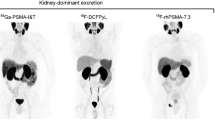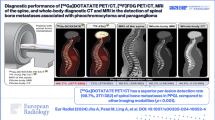Abstract
Purpose
The aim of this retrospective study was to determine whether patients with previous peptide receptor radionuclide therapy using high-activity 111In-pentetreotide can be safely treated with 177Lu-octreotate and whether addition of radiosensitising chemotherapy increases the toxicity of this agent.
Methods
Records of 27 patients (aged 17–75) who received 69 (median 3 per patient) 177Lu-octreotate administrations, including 29 in conjunction with radiosensitising infusional 5-fluorouracil (5-FU) (n = 27), or capecitabine (n = 2), between October 2005 and July 2007 subsequent to 1–8 prior cycles of 111In-pentetreotide therapy were analysed. Toxicity was assessed during and at 8–12 weeks post-treatment, with further long-term assessments including survival status reviewed till death or study close-out date of 1 November 2009.
Results
Reduction in blood counts was most marked following the first dose of 177Lu-octreotate but at early follow-up the only major haematological toxicity was a single case of grade 4 lymphopaenia. Both the presence of bone metastases and the administration of chemotherapy tended to result in greater reduction in blood counts, but these differences did not reach statistical significance. On long-term follow-up, 16 patients (59%) are alive with median overall survival of 36 months (32–44 months from first 177Lu-octreotate therapy). None of the recorded deaths was directly related to treatment toxicity. One patient had late grade 4 anaemia and thrombocytopaenia secondary to bone marrow failure from progressive infiltration by tumour. No other significant long-term haematological toxicities were recorded and no leukaemia was observed. No renal toxicity was observed on serial serum creatinine or radionuclide glomerular filtration rate (GFR) determination on initial or long-term follow-up.
Conclusion
177Lu-octreotate is a safe and well-tolerated therapy for patients who have previously been treated with 111In-pentetreotide and can be safely combined with radiosensitising chemotherapy. However, caution is recommended in patients with bone metastases. Significant late toxicities including bone marrow or renal failure, or leukaemia directly related to radionuclide therapy, did not occur in our series.



Similar content being viewed by others

References
Klöppel G. Tumour biology and histopathology of neuroendocrine tumours. Best Pract Res Clin Endocrinol Metab 2007;21(1):15–31.
Öberg K. Chemotherapy and biotherapy in neuroendocrine tumors. Curr Opin Oncol 1993;5:110–20.
Eriksson B, Öberg K. Summing up 15 years of somatostatin analog therapy in neuroendocrine tumors: future outlook. Ann Oncol 1999;10(Suppl 2):S31–8.
Rinke A, Müller HH, Schade-Brittinger C, Klose KJ, Barth P, Wied M, et al. Placebo-controlled, double-blind, prospective, randomized study on the effect of octreotide LAR in the control of tumor growth in patients with metastatic neuroendocrine midgut tumors: a report from the PROMID Study Group. J Clin Oncol 2009;27:4656–63.
Anthony LB, Woltering EA, Espanan GD, Cronin MD, Maloney TJ, McCarthy KE. Indium-111-pentetreotide prolongs survival in gastroenteropancreatic malignancies. Semin Nucl Med 2002;32:123–32.
Valkema R, De Jong M, Bakker WH, Breeman WA, Kooij PP, Lugtenburg PJ, et al. Phase I study of peptide receptor radionuclide therapy with [In-DTPA]octreotide: the Rotterdam experience. Semin Nucl Med 2002;32:110–22.
Otte A, Herrmann R, Heppeler A, Behe M, Jermann E, Powell P, et al. Yttrium-90 DOTATOC: first clinical results. Eur J Nucl Med 1999;26:1439–47.
Waldherr C, Pless M, Maecke HR, Schumacher T, Crazzolara A, Nitzsche EU, et al. Tumor response and clinical benefit in neuroendocrine tumors after 7.4 GBq (90)Y-DOTATOC. J Nucl Med 2002;43:610–6.
Valkema R, Pauwels S, Kvols L, Jamar F, Barone R, Bakker WH, et al. Long-term follow-up of a phase 1 study of peptide receptor radionuclide therapy (PRRT) with [90Y-DOTA0,Tyr3]octreotide in patients with somatostatin receptor positive tumours [abstract]. Eur J Nucl Med Mol Imaging 2003;30 Suppl 2:S232.
Kwekkeboom DJ, Bakker WH, Kooij PP, Konijnenberg MW, Srinivasan A, Erion JL, et al. [177Lu-DOTA0Tyr3]octreotate: comparison with [111In-DTPA0]octreotide in patients. Eur J Nucl Med 2001;28:1319–25.
Kwekkeboom D, De Herder W, Kam B, van Eijck CH, van Essen M, Kooij PP, et al. Treatment with the radiolabelled somatostatin analog [177Lu-DOTA0,Tyr3]octreotate: toxicity, efficacy, and survival. J Clin Oncol 2008;26(13):2124–30.
Kong G, Johnston V, Ramdave S, Lau E, Rischin D, Hicks RJ. High-administered activity In-111 octreotide therapy with concomitant radiosensitizing 5FU chemotherapy for treatment of neuroendocrine tumors: preliminary experience. Cancer Biother Radiopharm 2009;24(5):527–33.
Rolleman EJ, Valkema R, de Jong M, Kooij PP, Krenning EP. Safe and effective inhibition of renal uptake of radiolabelled octreotide by a combination of lysine and arginine. Eur J Nucl Med Mol Imaging 2003;30:9–15.
Behr TM, Goldenberg DM, Becker W. Reducing the renal uptake of radiolabeled antibody fragments and peptides for diagnosis and therapy: present status, future prospects and limitations. Eur J Nucl Med 1998;25:201–12.
Forrer F, Uusijärvi H, Storch D, Maecke H, Mueller-Brand J. Treatment with 177Lu-DOTATOC of patients with relapse of neuroendocrine tumors after treatment with 90Y-DOTATOC. J Nucl Med 2005;46:1310–6.
Sierra ML, Agazzi A, Bodei L, Pacifici M, Aricò D, De Cicco C, et al. Lymphocytic toxicity in patients after peptide-receptor radionuclide therapy (PRRT) with 177Lu-DOTATATE and 90Y-DOTATOC. Cancer Biother Radiopharm 2009;24(6):659–65.
Konijnenberg MWE, Bijster M, Krenning E, De Jong M. A stylized computational model of the rat for organ dosimetry in support of preclinical evaluations of peptide receptor radionuclide therapy with (90)Y, (111)In, or (177)Lu. J Nucl Med 2004;45:1260–9.
Flynn AA, Pedley RB, Green AJ, Dearling JL, El-Emir E, Boxer GM, et al. The nonuniformity of antibody distribution in the kidney and its influence on dosimetry. Radiat Res 2003;159:182–9.
Kwekkeboom D, Bakker W, Kam BLR, Teunissen JJ, Kooij PP, de Herder WW, et al. Treatment of patients with gastro-entero-pancreatic (GEP) tumours with the novel radiolabelled somatostatin analogue [177Lu-DOTA0,Tyr3]octreotate. Eur J Nucl Med Mol Imaging 2003;30:417–22.
van Essen M, Krenning EP, Kam BL, de Herder WW, van Aken MO, Kwekkeboom DJ. Report on short-term side effects of treatments with 177Lu-octreotate in combination with capecitabine in seven patients with gastroenteropancreatic neuroendocrine tumours. Eur J Nucl Med Mol Imaging 2008;35:743–8.
Conflicts of interest
None.
Author information
Authors and Affiliations
Corresponding author
Rights and permissions
About this article
Cite this article
Hubble, D., Kong, G., Michael, M. et al. 177Lu-octreotate, alone or with radiosensitising chemotherapy, is safe in neuroendocrine tumour patients previously treated with high-activity 111In-octreotide. Eur J Nucl Med Mol Imaging 37, 1869–1875 (2010). https://doi.org/10.1007/s00259-010-1483-4
Received:
Accepted:
Published:
Issue Date:
DOI: https://doi.org/10.1007/s00259-010-1483-4



